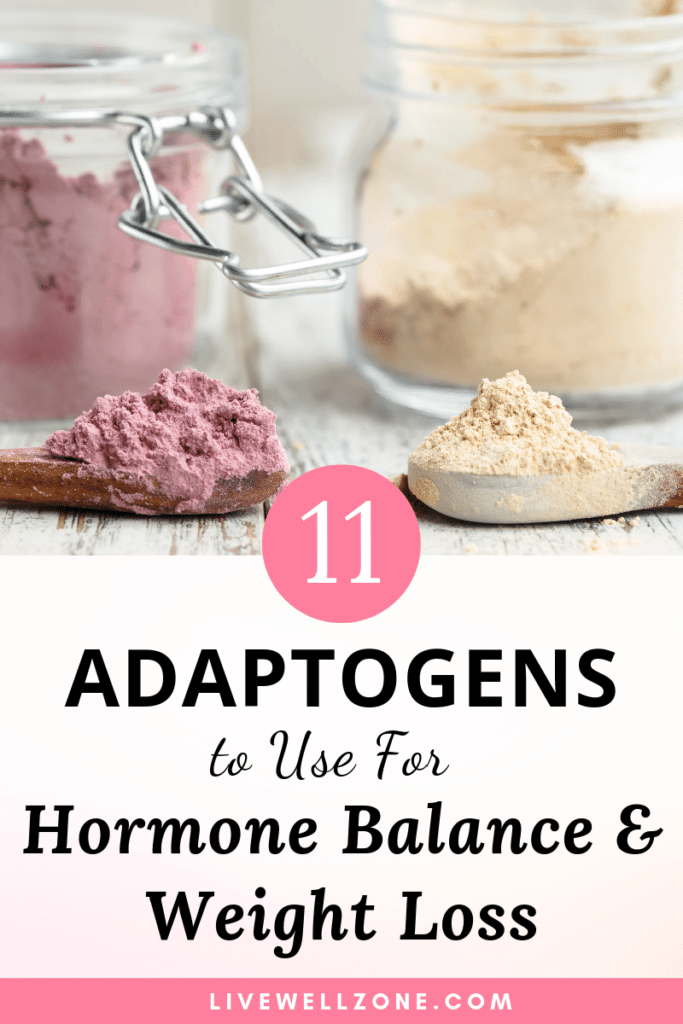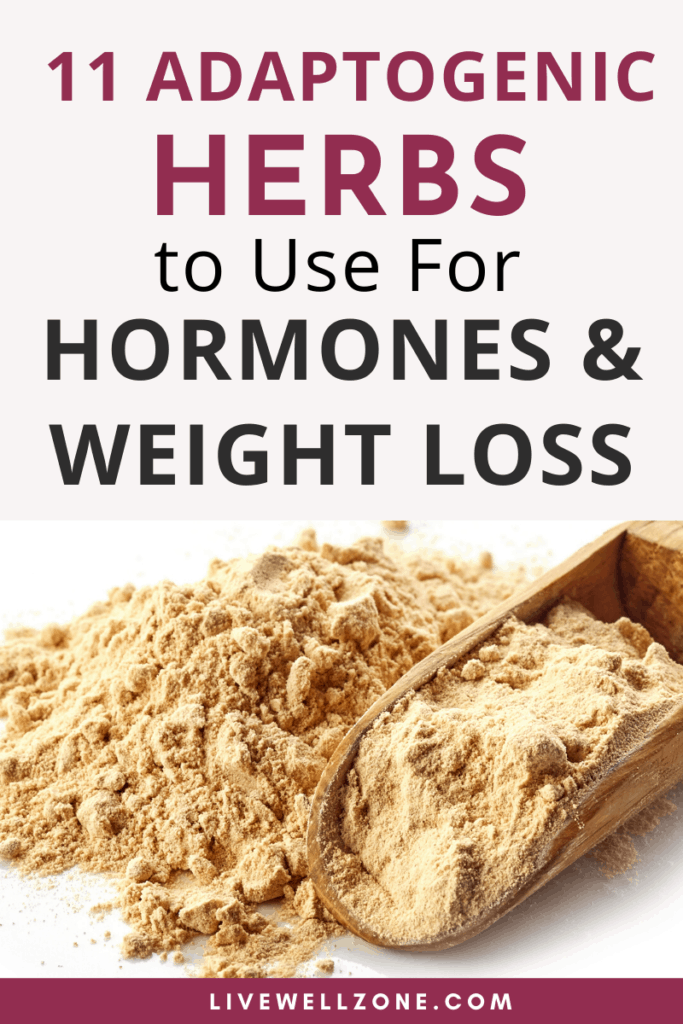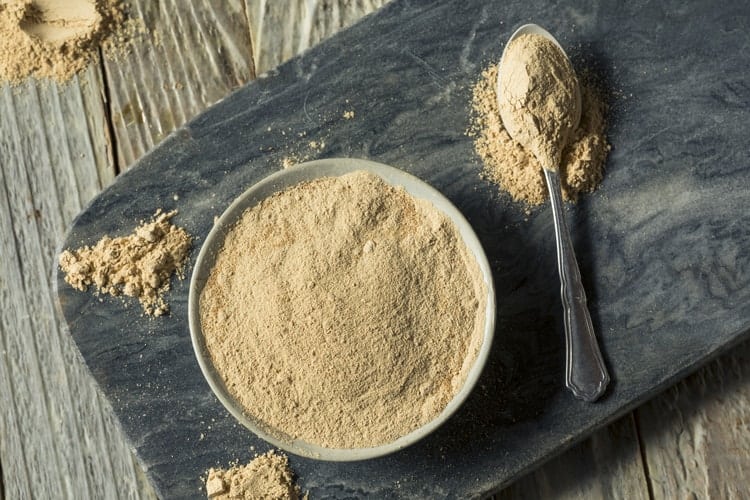
If you’re looking for a natural way to boost your energy, support weight loss and improve your overall health then it’s time to consider using adaptogens for hormone balance.
Now, if you’ve never heard the term “adaptogens” or “adaptogenic herbs” before it simply refers to a set of roots, herbs, and mushrooms that protect us from the damaging effects of stress.
What’s particularly interesting about adaptogenic foods and herbs is that they are generally considered safe and nontoxic.
Plus, they are most famous for helping the body return to a state of homeostasis (i.e. natural balance).
So, now that we’ve covered the basics, here’s what you will get from this guide:
- the best adaptogens that can help you get back into a state of balance.
- recommended brands and products to use for the best quality adaptogenic herbs.
- how stress affects your hormones, weight and overall health.
NOTE: This post contains affiliate links and I earn a commission (at no additional cost to you) if you use them to make a purchase.
11 ADAPTOGENIC HERBS FOR HORMONE BALANCE AND WEIGHT LOSS
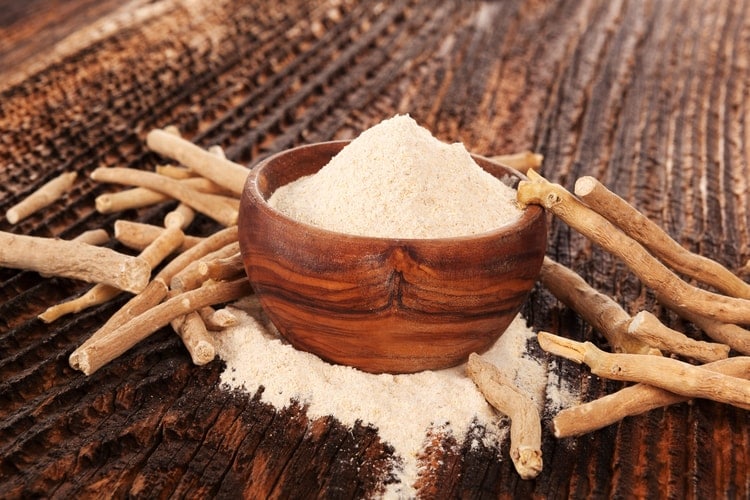
1. Ashwagandha
Perhaps no adaptogen is as (in)famous as ashwagandha! Not only has it been traditionally used in Ayurvedic medicine, but it has an exhaustive list of potential benefits. For example, it is said to (1, 2, 3, 4):
- stabilize mood.
- restore healthy cortisol levels.
- improve insulin sensitivity.
- balance the immune system.
- regulate estrogen and progesterone levels.
- support healthy thyroid function.
- act as a natural tonic to reduce inflammation.
- promote overall health and longevity.
- protect the brain from oxidative stress.
In addition, studies done with mice show that ashwagandha also promotes the death of cancer tumors. While more studies are needed to confirm this action in humans, it’s clear that ashwagandha is an herb to keep an eye on.
2. Holy Basil (aka Tulsi)
When it comes to protecting the body from stress, holy basil has been shown to be quite a powerhouse.
For example, a paper from the Journal of Ayurveda and Integrative Medicine, indicates that holy basil:
- Protects organs and tissues against chemical stress.
- Provides relief from emotional stress (thanks to its anti-depressant properties).
- Normalizes blood glucose, blood pressure and triglyceride levels.
3. Rhodiola Rosea
Research shows that the rhodiola rosea plant may help to:
- boost energy.
- ease depression.
- enhance concentration.
- improve metabolism.
In addition, rhodiola regulates cortisol production, ultimately reducing the workload on the adrenal glands (source).
Note: There are different varieties of rhodiola. Make sure to get rhodiola rosea for the best results.
4. Schisandra Berries
Because of its ability to reduce the production of excess cortisol, schisandra berries may:
- improve cognitive function.
- reduce adrenal exhaustion.
- boost fertility.
In fact, a study done on rats shows that levels of cortisol and nitric oxide – both of which go up during stressful times – remain quite stable in rats given schisandra.
This happens even when the rats are exposed to more stress.
(To learn more about the other benefits of schisandra berries for fertility, skin and more, check out this article on schisandra berries for hormone health).
5. Siberian Ginseng (aka Eleuthero)
This lesser known, but powerful, adaptogen contains compounds that might help to (5, 6, 7):
- Fight fatigue.
- Improve insomnia.
- Increase energy.
- Use up fat for energy.
- Boost memory.
- Improve endurance.
In addition to the above, research suggests that Siberian ginseng supports immune function, stabilizes blood sugar and shortens the duration of respiratory infections.
6. Reishi Mushrooms

Often used as a longevity tonic in Chinese medicine, some experts have suggested that reishi could be used as part of the treatment plan for obesity.
This suggestion is based on a 2015 study that was performed with mice that were fed a high fat diet. One set of mice ate only the high fat foods, while another set of mice ate reishi extract and high fat foods.
During the course of the study, the first set of mice saw their weight go up to 42 grams, while the second set of mice had less weight gain (they got up to 35 grams).
Overall, the researchers concluded that the mice that were fed reishi had different types of gut bacteria, compared to the mice that were not given reishi.
And the change is gut flora is what seems to be responsible for reishi’s ability to curb weight gain.
Aside from these benefits, reishi mushrooms are often used to (source):
- support immune function.
- reduce aches and pains.
- support brain health.
- lower blood sugar.
7. Shatavari
In Ayurvedic medicine, shatavari is often used as a tonic for women through all phases of life.
Its potential benefits include (source):
- Soothing irritability and mood swings.
- Easing mood swings.
- Improving sleep quality.
- Boosting sex drive.
- Supporting immune function and antioxidant activity.
8. Cordycep Mushrooms
Although it is not an herb, cordycep mushrooms are known to have adaptogenic properties.
In fact, a mouse study revealed that cordycep mushrooms has “antifatigue” and hormone regulating properties (source).
In addition, cordyceps seem to have important benefits for us as we age. This was shown in a human study with people aged 50-75 who had improved exercise performance as a result of taking cordyceps (source).
Furthermore, a study with older mice also showed that cordycep mushroom increased levels of antioxidants (source).
9. Maca
This sweet-tasting root is native to South America and comes in yellow, red and black varieties. Red maca is most often suggested for women, black maca for men and yellow maca for every day hormone support.
Historically, maca has been used to (source):
- Improve various adrenal fatigue symptoms.
- Restore healthy libido.
- Improve overall mood.
- Support healthy function of the HPA (hypothalamic pituitary adrenal) axis, which is our main stress response pathway.
- Improve fertility.
To learn more about how this adaptogenic root, including tips for choosing the right type, check out this guide on how to use maca for hormone balance.
10. Licorice Root
Although the word “licorice” is often associated with candy, licorice root is actually a powerful herb that may help to regulate cortisol levels.
And when it comes specifically to weight loss, some research suggests that it may lower BMI (body mass index). However, the research also pointed that licorice root could raise blood pressure, making it unsuitable for those with hypertension (source).
In addition, licorice may have other hormone-related benefits, such as:
- potentially more effective than hormone replacement therapy when it comes to reducing the duration of hot flashes.
- it may play a role in supporting fertility and improving irregular periods in women with PCOS.
11. Astragalus
This herb has a long history of use in Chinese medicine, where it’s used to fight diseases, as well as the effects of physical and mental stress.
In addition, modern science is now confirming that astragalus may help to:
- Relieve insulin resistance.
- Boost the immune system.
- Prevent the growth of tumors.
- Support wound healing.
- Fight off colds and flu.
- Prevent skin damage that results from free radicals.
ADAPTOGEN SUPPLEMENTS FOR HORMONE AND WEIGHT LOSS SUPPORT
1. Goldmine Adaptogen Powder

With a combination of ashwagandha, astragalus, reishi and cordyceps this blend gives you the synergistic benefits of multiple adaptogens.
In addition, the formula contains chaga mushrooms (also an adaptogenic mushroom) and rosehips (which are rich in vitamin Ca nutrient that improves the absorption of the mushrooms).
2. Maca Powder from The Maca Team
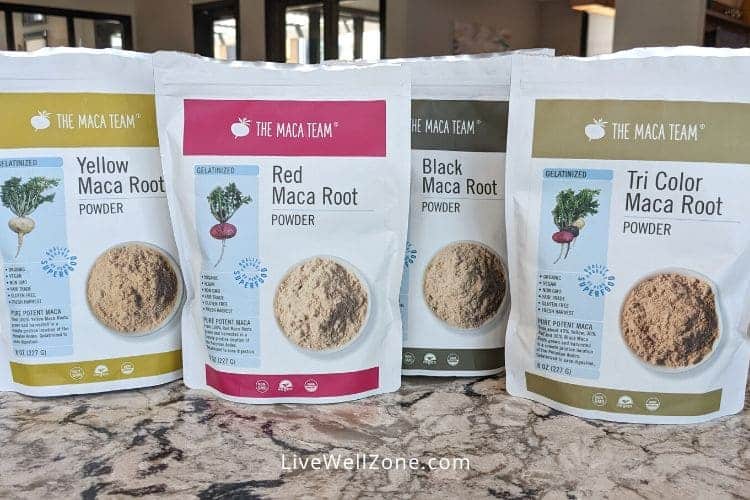
My go-to source for pure maca is The Maca Team, a family-run company that has been making maca products for 15+ years.
Their maca is grown in Peru – where maca has a long history of use – and is available in two main forms:
- gelatinized maca (aka cooked maca): this is easier to digest.
- raw maca: in its whole form, maca can be a little harder to digest. So this is best for those with a healthy digestive system.
Lastly, keep in mind that there are also different colors of maca.
The yellow type is best for most people because it is less stimulating, compared to the red and black forms which are more stimulating.
Experts generally suggest that women use the red type.
3. Adrenal Health Daily from Gaia Herbs

If you’ve got signs of adrenal imbalance and you feel “stressed and overworked” – as stated on the packaging – then you’ll want to look into this supplement.
Made with holy basil, schisandra, ashwagandha and rhodiola, this formula has some of the best herbs supporting adrenal function.
As far as the brand goes, Gaia Herbs was the first brand that really opened my eyes to the power of herbal supplements.
One of the things I’ve always liked about their capsules is that they are soft with a liquid extract inside.
Compared to hard capsules, they’re easier to breakdown and absorb.
HOW TO USE ADAPTOGENS FOR HORMONE BALANCE & WEIGHT LOSS
Adaptogens can be consumed in the form of powders or as supplements (capsule or tinctures).
If using them in powder form, you can add adaptogens to:
- smoothies.
- smoothies.
- desserts (maca has a pleasant, sweet flavor that is ideal for this).
- porridge, such as cooked oatmeal (once again, maca’s natural sweetness works well for this purpose).
When buying adaptogens you can go for a single herb or a blend. When formulated correctly, blends allow you to get the synergistic benefits of the herbs (and the manufacturer has already put everything in the right proportions for you – hopefully!).
BENEFITS OF ADAPTOGENIC HERBS FOR HORMONES, WEIGHT LOSS, ENERGY & OVERALL HEALTH
Although each adaptogen has its own unique benefit, the one thing that they all have in common is their ability to support the body’s stress response.
In addition, adaptogens may also help to:
- balance blood sugar.
- protect us from free radical damage (thanks to their antioxidant content).
- protect the liver.
- improve the body’s ability to process and detox toxins.
- reduce sugar and alcohol cravings.
- support immune health.
- increase energy and performance.
- boost stamina and motivation.
- improve muscle tone and strength.
- facilitate recovery from illness.
- improve brain function.
- reduce anxiety.
- support healthy sleep quality.
- improve eyesight and hearing.
- stabilize mood.
- improve the body’s ability to assimilate protein.
THE LINK BETWEEN STRESS, HORMONAL IMBALANCE (WEIGHT GAIN)
When we are under stress, 2 systems in the body kick in:
- the adrenal glands
- the sympathetic nervous system
Adrenal Glands
These glands produce “stress” hormones like cortisol and adrenaline.
Even though, these hormones are commonly referred to as “stress” hormones, they’re actually friendly hormones.
That’s because these hormones are part of the emergency toolkit that nature gives us so that we can handle stressful situations.
They work best when we are dealing with acute or short-term stress.
Sympathetic Nervous System
This is the part of the nervous system that’s often referred to as the “fight or flight” system.
When it’s time to fight or run away, that means the body needs to use up more energy and increase blood supply.
So, during times of stress, our breathing is faster, heart rate speeds up, blood pressure goes up and our blood sugar levels go up.
Just like with the adrenals, the sympathetic nervous system is designed to work for us when we’re facing short-term stress.
With acute or short-term stress, the stressor eventually goes away and the body returns to its normal state.
This means that when the stressor is eliminated, the adrenals and the sympathetic nervous system turn OFF (or at least their volume is dialed down).
However, when there is prolonged stress, the adrenals and the sympathetic nervous system are permanently turned ON.
This prolonged stress can contribute to a variety symptoms like:
- weight gain
- adrenal fatigue
- thyroid dysfunction
- other hormonal imbalances
- low energy and chronic fatigue
- difficult sleeping
- high cholesterol
- digestive ulcers
- leaky gut
- diabetes
- hypothyroidism
- hot flashes
- heart palpitations
- erratic menstrual cycles
- insomnia
- …and so on.
THE 3 TYPES OF STRESS AND THEIR EFFECT ON HORMONES

We often think of stress as being exclusively emotional. But there are actually 3 types of stress that we all face in life.
They are:
1. Emotional stress: This could be the rage that arises when someone cuts us off in traffic, or when we’re facing financial difficulties.
2. Physical stress: This can come from some sort of physical injury. For example, bumping your knee against a chair or cutting a finger while cooking.
3. Chemical stress: This results from exposure to toxins, such as pesticides, processed food, dirty water, and so on.
As you can see, stress is about much more than just emotions.
Our current living conditions, where we’re surrounded by GMOs, pesticides and other chemicals place our bodies under a state of permanent stress.
In some ways, this is the most dangerous type of stress because it doesn’t kill us immediately. Nor does it lead to immediate symptoms.
Instead it wears us down slowly…or more specifically, it wears down our hormone production system month after month, year after year.
Then one day we wake up and notice that our bodies are changing for the worse. And from our perspective, the changes seemed to have happened overnight.
But in reality, the symptoms and root cause has been building up over time. Going unnoticed!
What’s particularly interesting about stress is that the body doesn’t distinguish between emotional, physical or chemical stress.
All stress is handled in the same way: the adrenals kick in and release anti-inflammatory hormones (such as cortisol).
So, based on all this, we can start to see why chronic stress of any kind is harmful.
This highlights just how strongly we need something that can help us manage stress.
That “something” is adaptogens, which we are now going to look at more closely.
CONCLUSION
Adaptogens are powerful plants that can play an important in bringing balance to your body.
Just remember that as with all herbs, they should be used as part of a healthy diet and lifestyle.
In addition, always check with your doctor before combining these herbs with any prescribed medication.
You Might Also Like:
How To Use Adaptogens for Estrogen Dominance Relief
The Benefits of Nettle for Hormones and The #1 Way To Use It
Adaptogens For PCOS: Why You Need Them and Which Ones To Use
Best Adaptogenic Herbs For Adrenal Fatigue And How To Use Them
How To Use Bee Pollen, Manuka Honey and Royal Jelly for Hormone Imbalance
Adaptogens for Hormonal Acne: What To Use and How To Use
3 Supplements For Female Hormonal Imbalance (you probably don’t know about)
How to Use Schisandra Berries for Hormonal Health
